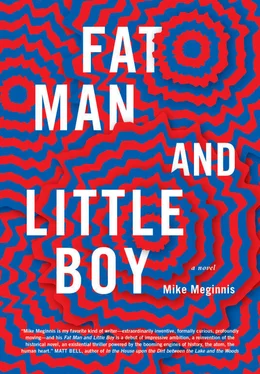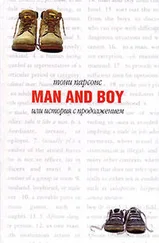“Matthew,” says the teacher. “Matthew, please come to the front of the class and deliver your recitation.”
Little Boy raises his hand. The teacher sighs.
“Yes Matthew?”
“Whadda you want?” says Little Boy, in English.
“Could you please come to the front of the class and deliver your recitation?”
Little Boy looks to Claire for help. She’s mortified, nearly to the point of tears on his behalf. It must be pretty bad. Peter motions toward the front, walks his fingers down the aisle, mimes loud, obnoxious speech in what seems to be an imitation of their teacher: hand on gut, eyes half-squinted/quarter-crossed, finger twirling in the air.
Sometimes Little Boy can make the teacher forget him by force of will. He stares into the back of the next student’s neck, seeing the strawberry beginnings of a pimple where it meets the shoulders, and a long, stray black hair. He imagines scratching off the cap of the zit—squeezing out the pus.
The teacher says, “Matthew?”
He goes to the front of the class. A room full of children, most taller than him, all more developed, gaze back perfectly blank. They scratch, boys and girls alike, at the hair that prickles from their arms. There’s a boy in the back who’s clearly touching himself with the sort of care and tenderness most commonly found between little old ladies and large, stupid dogs.
“What am I supposed to do up here?”
“Please share your work with the class. You may read from notes if you need to.”
Little Boy looks to Claire. Looks to Peter. His friends, such as they are, have averted their eyes. Claire taps her foot on the floor, a metronome in skirts.
“Ah,” says Little Boy. “I know. You’ll like this!”
“In French, please.”
Little Boy brushes past the bumbling teacher, goes to his desk, and slides out the wide middle drawer, where confiscated items are kept, as well as several candles the teacher uses to light his work after dark. The school building has not been furnished with electric lights, and the oil is expensive. Little Boy takes one of the fresh, unused candles. He walks to center stage, candle cupped in both hands. He turns the candle upside-down. He passes his hand under it, passes it over, as if to draw aside many small, silken curtains.
“What are you doing?”
Little Boy puts his fingers to his lips. “What I do next will astound you.”
“Please sit down, Matthew.”
“An American magic trick,” says Little Boy. “Fire from the hands.”
He presses his fingers to the wick, snaps them, lets go. The wick is cold and still. He does it again. Nothing. No flame. It ought to burn with a Japanese spirit. He tries again. His teacher tells him to sit down, he thinks. But he doesn’t want to sit down. He wants to make a fire for his classmates.
“Wait,” he says. He tries again.
The candle is a candle. It is a little yellow, only a little, the color of mucus. Cold and inert as a stone.
The teacher puts his hands on Little Boy’s shoulders. The pressure of his chalky hands. White prints on Little Boy’s shoulders. “Matthew,” he says, and then some other words that probably mean Little Boy’s in trouble.
“I’ve got it.” Little Boy lifts the candle to his mouth, both-handed, like a goblet. He puts the wick in his mouth, suckles, and slowly pulls it free from his suck. His hands go orange. A small flame on the little candle. Several students clap with half their hearts. “There it is. See how pretty.”
It warms his face from underneath. He imagines the light crawling up his neck, his chin, the sides of his face, highlighting everything sunken and all that protrudes.
The teacher snuffs it with his fingers. Little Boy’s no longer lit up. His hands and face are cold. He sits down, taking the candle with him. The teacher may tell him to bring it back. If so, he doesn’t listen, and the teacher doesn’t press the issue.
Later, Claire passes him a note. “Learn the language,” it says, though in French. He has an inkling what it means. He tries to lose the inkling.
Little Boy knocks on the door of Mr. Wakahisa Masumi’s cabin. He has a bundle of cleaning supplies under his arm. A broom, a mop, a feather-duster, a small folding stepladder, all bound together with a thin white rope tied by Fat Man in a tight bow. Hanging from the other hand, a bucket with a garbage bag inside, several rags, sponges, soap, a water jug. It’s heavy.
He sets down the bucket and leans the bundle against the cabin. Having waited what seems a reasonable length of time, he knocks again. He scratches at his shin with the heel of his shoe, careful not to open the scab from his fall, which has mostly healed, leaving an angry patch of skin. Mr. Wakahisa does not come to the door.
“Sir. Sir.” He looks over his shoulder. “I’ve come to clean your room.”
Nothing. But he saw the Japanese gentleman walk in. He had been waiting outside the cabin twenty minutes, saw Masumi come from the library—where he gave language lessons, no doubt—and watched in hiding as Masumi went inside. Little Boy had waited another ten minutes to let him settle in, and so he did not realize he had been waited for.
Masumi couldn’t have fallen asleep in ten minutes. He must be sitting somewhere inside. There’s a lot of room in there for one person. Several chairs, the bed, a couch. He could be standing. He is not pacing, or if he is it’s in a pair of slippers; Little Boy can’t hear him. He could be in bed reading. He could be feeding the fire. The sun is going down. Little Boy’s shadow stretches sideways, long, like a banner. It seems awfully tall.
Little Boy knocks hard.
“Mr. Wakahisa?” says Little Boy. “Can I please come in? I need to finish this and do my school work.”
As Little Boy attempts to gather his cleaning gear Masumi comes out of his cabin, locking the door behind him.
“John?” he says.
“No, it’s Matthew.”
Masumi speaks now in French. “John, how are you this evening?”
“Matthew,” says Little Boy. “John’s the big one.”
“How are you this evening?”
Matthew shrugs. “Don’t know French. Can I clean your cabin now?”
Masumi tries Japanese. “How are you this evening?”
“Don’t know that either. Are you going to let me in or not? I can come back later.”
And still in Japanese: “Why don’t you learn the language?”
Little Boy lays down his burdens. He looks up at Masumi, arms hanging limp at his sides but hands curled to fists; his lips are sneered. After a long while he says, “They told me you spoke English.”
“I’m trying to teach you. I’m trying to know you.”
“Still don’t know French, sir.”
“English then. You may come into my cabin only so long as you don’t try to clean it. Leave your things there, in the grass.”
“Can I bring them in, so no one sees them there? So I can say I did it? I wouldn’t have to bother you again for days.”
“Yes John,” says Masumi. He takes the bucket himself. “That will be fine.”
“It’s Matthew,” says Little Boy.
“Do you ever drink?” says Masumi. They sit on opposite sides of the table, a gallery of weird liquors between them. Every fruit is represented: cherry brandy, pineapple rum, lemon-lime martini, a globular bottle with clear brownish liquor, oranges floating inside. And other unexpected flavors: chocolate whiskey, toffee something, pine.
“I think I’m not allowed to,” says Little Boy.
The room is very clean. There is a brown screen in the corner with cherry tree shadows painted in black on two of three panels; the center panel has a black sun in its high middle. The dresser has a white powder on its top but otherwise it’s clean. The full-length mirror has several fingerprints across its middle point, oil streaks. The bed is neatly made. There are many trunks beneath the bed. The floor around the stove shows no charcoal specks or smudges. There are several variously sized glasses and flasks littering the various surfaces of the room, but the flasks are all closed and the glasses are dry.
Читать дальше












